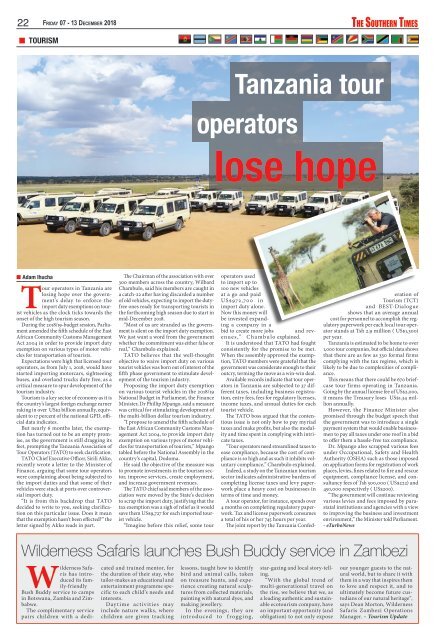You also want an ePaper? Increase the reach of your titles
YUMPU automatically turns print PDFs into web optimized ePapers that Google loves.
22 Friday 07 - 13 December 2018 <strong>The</strong> <strong>Southern</strong> <strong>Times</strong><br />
■ TOURISM<br />
Tanzania tour<br />
operators<br />
lose hope<br />
■ Adam Ihucha<br />
Tour operators in Tanzania are<br />
losing hope over the government’s<br />
delay to enforce the<br />
import duty exemptions on tourist<br />
vehicles as the clock ticks towards the<br />
onset of the high tourism season.<br />
During the 2018/19-budget session, Parliament<br />
amended the fifth schedule of the East<br />
African Community Customs Management<br />
Act 2004 in order to provide import duty<br />
exemption on various types of motor vehicles<br />
for transportation of tourists.<br />
Expectations were high that licensed tour<br />
operators, as from July 1, 2018, would have<br />
started importing motorcars, sightseeing<br />
buses, and overland trucks duty free, as a<br />
critical measure to spur development of the<br />
tourism industry.<br />
Tourism is a key sector of economy as it is<br />
the country’s largest foreign exchange earner<br />
raking in over US$2 billion annually, equivalent<br />
to 17 percent of the national GPD, official<br />
data indicates.<br />
But nearly 6 months later, the exemption<br />
has turned out to be an empty promise,<br />
as the government is still dragging its<br />
feet, prompting the Tanzania Association of<br />
Tour Operators (TATO) to seek clarification.<br />
TATO Chief Executive Officer, Sirili Akko,<br />
recently wrote a letter to the Minister of<br />
Finance, arguing that some tour operators<br />
were complaining about being subjected to<br />
the import duties and that some of their<br />
vehicles were stuck at ports over controversial<br />
import duty.<br />
“It is from this backdrop that TATO<br />
decided to write to you, seeking clarification<br />
on this particular issue. Does it mean<br />
that the exemption hasn’t been effected?” the<br />
letter signed by Akko reads in part.<br />
<strong>The</strong> Chairman of the association with over<br />
300 members across the country, Wilbard<br />
Chambulo, said his members are caught in<br />
a catch-22 after having discarded a number<br />
of old vehicles, expecting to import the dutyfree<br />
ones ready for transporting tourists in<br />
the forthcoming high season due to start in<br />
mid-December 2018.<br />
“Most of us are stranded as the government<br />
is silent on the import duty exemption.<br />
We just want a word from the government<br />
whether the commitment was either false or<br />
real,” Chambulo explained.<br />
TATO believes that the well-thought<br />
objective to waive import duty on various<br />
tourist vehicles was born out of interest of the<br />
fifth phase government to stimulate development<br />
of the tourism industry.<br />
Proposing the import duty exemption<br />
on various tourist vehicles in the 2018/19<br />
National Budget in Parliament, the Finance<br />
Minister, Dr Phillip Mpango, said a measure<br />
was critical for stimulating development of<br />
the multi-billion dollar tourism industry.<br />
“I propose to amend the fifth schedule of<br />
the East African Community Customs Management<br />
Act 2004, to provide import duty<br />
exemption on various types of motor vehicles<br />
for transportation of tourists,” Mpango<br />
tabled before the National Assembly in the<br />
country’s capital, Dodoma.<br />
He said the objective of the measure was<br />
to promote investments in the tourism sector,<br />
improve services, create employment,<br />
and increase government revenues.<br />
<strong>The</strong> TATO chief said members of the association<br />
were moved by the State’s decision<br />
to scrap the import duty, justifying that the<br />
tax exemption was a sigh of relief as it would<br />
save them US$9,727 for each imported tourist<br />
vehicle.<br />
“Imagine before this relief, some tour<br />
operators used<br />
to import up to<br />
100 new vehicles<br />
at a go and paid<br />
US$972,700 in<br />
import duty alone.<br />
Now this money will<br />
be invested expanding<br />
a company in a<br />
bid to create more jobs and revenues,”<br />
Chambulo explained.<br />
It is understood that TATO had fought<br />
consistently for the promise to be met.<br />
When the assembly approved the exemption,<br />
TATO members were grateful that the<br />
government was considerate enough to their<br />
outcry, terming the move as a win-win deal.<br />
Available records indicate that tour operators<br />
in Tanzania are subjected to 37 different<br />
taxes, including business registration,<br />
entry fees, fees for regulatory licenses,<br />
income taxes, and annual duties for each<br />
tourist vehicle.<br />
<strong>The</strong> TATO boss argued that the contentious<br />
issue is not only how to pay myriad<br />
taxes and make profits, but also the modality<br />
and time spent in complying with intricate<br />
taxes.<br />
“Tour operators need streamlined taxes to<br />
ease compliance, because the cost of compliance<br />
is so high and as such it inhibits voluntary<br />
compliance,” Chambulo explained.<br />
Indeed, a study on the Tanzanian tourism<br />
sector indicates administrative burdens of<br />
completing license taxes and levy paperwork<br />
place a heavy cost on businesses in<br />
terms of time and money.<br />
A tour operator, for instance, spends over<br />
4 months on completing regulatory paperwork.<br />
Tax and license paperwork consumes<br />
a total of his or her 745 hours per year.<br />
<strong>The</strong> joint report by the Tanzania Confederation<br />
of<br />
Tourism (TCT)<br />
and BEST-Dialogue<br />
shows that an average annual<br />
cost for personnel to accomplish the regulatory<br />
paperwork per each local tour operator<br />
stands at Tsh 2.9 million ( US$1,300)<br />
per year.<br />
Tanzania is estimated to be home to over<br />
1,000 tour companies, but official data shows<br />
that there are as few as 330 formal firms<br />
complying with the tax regime, which is<br />
likely to be due to complexities of compliance.<br />
This means that there could be 670 briefcase<br />
tour firms operating in Tanzania.<br />
Going by the annual license fee of US$2,000,<br />
it means the Treasury loses US$1.34 million<br />
annually.<br />
However, the Finance Minister also<br />
promised through the budget speech that<br />
the government was to introduce a single<br />
payment system that would enable businessmen<br />
to pay all taxes under one roof in a bid<br />
to offer them a hassle-free tax compliance.<br />
Dr. Mpango also scrapped various fees<br />
under Occupational, Safety and Health<br />
Authority (OSHA) such as those imposed<br />
on application forms for registration of work<br />
places, levies, fines related to fire and rescue<br />
equipment, compliance license, and consultancy<br />
fees of Tsh 500,000 ( US$222) and<br />
450,000 respectively ( US$200).<br />
“<strong>The</strong> government will continue reviewing<br />
various levies and fees imposed by parastatal<br />
institutions and agencies with a view<br />
to improving the business and investment<br />
environment,” the Minister told Parliament.<br />
- eTurboNews<br />
Wilderness Safaris launches Bush Buddy service in Zambezi<br />
Wilderness Safaris<br />
has introduced<br />
its family-friendly<br />
Bush Buddy service to camps<br />
in Botswana, Zambia and Zimbabwe.<br />
<strong>The</strong> complimentary service<br />
pairs children with a dedicated<br />
and trained mentor, for<br />
the duration of their stay, who<br />
tailor-makes an educational and<br />
entertainment programme specific<br />
to each child’s needs and<br />
interests.<br />
Daytime activities may<br />
include nature walks, where<br />
children are given tracking<br />
lessons, taught how to identify<br />
bird and animal calls, taken<br />
on treasure hunts, and experience<br />
creating natural sculptures<br />
from collected materials,<br />
painting with natural dyes, and<br />
making jewellery.<br />
In the evenings, they are<br />
introduced to frogging,<br />
star-gazing and local story-telling.<br />
“With the global trend of<br />
multi-generational travel on<br />
the rise, we believe that we, as<br />
a leading authentic and sustainable<br />
ecotourism company, have<br />
an important opportunity (and<br />
obligation) to not only expose<br />
our younger guests to the natural<br />
world, but to share it with<br />
them in a way that inspires them<br />
to love and respect it, and to<br />
ultimately become future custodians<br />
of our natural heritage”,<br />
says Dean Morton, Wilderness<br />
Safaris Zambezi Operations<br />
Manager. – Tourism Update




